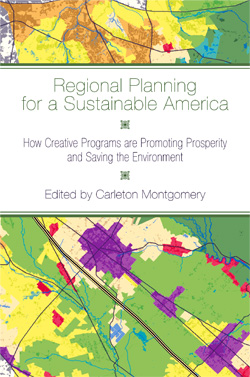Portland Metro is probably America’s most famous regional agency, and it has the distinction of being the only one with its own home rule charter within the state’s constitution, and a governing body directly elected by residents living within the region’s geographic jurisdiction. Metro’s charter gives it authority to set and manage this metropolitan region’s Urban Growth Boundary (UGB) and to create a Future Vision and long-range Regional Planning Framework for all land use planning in the region.
Not surprisingly, the agency’s primary focus has been setting and adjusting the UGB to control sprawl and preserve natural and agricultural lands outside the boundary. But Metro does much more. The agency also uses zoning mandates, transportation investment, land acquisition and planning incentives to encourage efficient use of land within the growth boundaries. Portland Metro mandates minimum densities for some areas within the UGB in order to prevent local governments from defeating the plan through low-density zoning. Portland Metro’s land use powers do not displace, but rather direct and supplement municipal zoning within Metro’s jurisdiction.
Vital Statistics:
Chapter of the Book: 1
State: OR
Year Established: 1992
Geographic Scale: 296,514 acres
Mandatory or Voluntary over Local Government: Mandatory
Authorizing Laws: State
Agencies and Organizations:
Resources:
Portland Urban Growth Boundary Map
Oregon Land Use Planning Act, ORS 197.005
Oregon’s Statewide Planning Goals and Guidelines
Urban Growth Management Functional Plan
Selected References:
Abbot, C. 2001. Greater Portland: Urban Life and Landscape in the Pacific Northwest. Philadadelphia: University of Pennsylvania Press.
Abbott, C. 2002. Planning a Sustainable City: The Process and Performance of Portland’s Urban Growth Boundary, in Squires, G.D. (ed.), Urban Sprawl: Causes, Consequences and Policy Responses. Urban Institute Press.
Aoki, K. 2005. All the King’s Horses and All the King’s Men: Hurdles To Putting the Fragmented Metropolis Back Together Again? Statewide Land Use Planning, Portland Metro and Oregon’s Measure 37. Journal of Law and Policy. 21:397-450.
Benner, R. 2009. Portland Metropolitan Region turns a Climate Change Corner, in Low Carbon Cities. ISOCARP Review 05. www.isocarp.org/index.php?id=145.
Cortright, J. 2007. Portland’s Green Dividend, White Paper for CEOs for Cities. CEOs For Cities. www.ceosforcities.org/files/PGD%20FINAL.pdf.
Howe, D. 2004. The Reality of Portland’s Housing Market, in Ozawa, C. (ed), Portland Edge: Challenges and Successes in Growing Communities. Washington, D.C.: Island Press.
Ozawa, C. (ed.) 2004. The Portland Edge: Challenges and Successes in Growing Communities. Washington, D.C.: Island Press.

